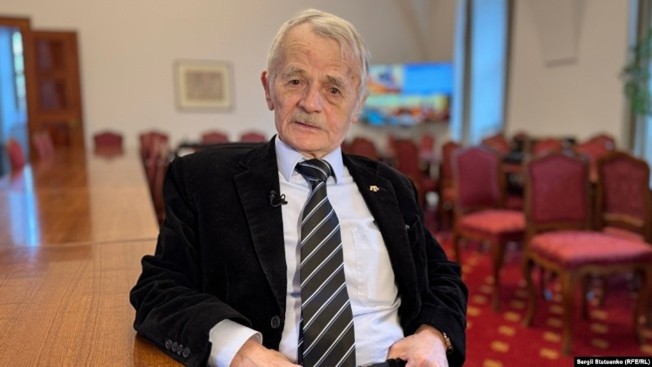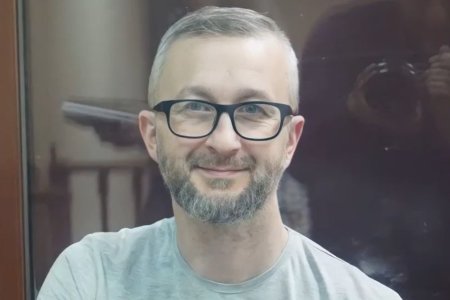
Any so-called peace deal with Russia that involves acceptance of Russian occupation of Crimea would mean disaster for the Crimean Tatar people. “We struggled for half a century to be able to return to our homeland; now we are again forced to flee”
This stark warning was issued in an interview to Crimean Realities by Mustafa Dzhemilev, world-renowned Crimean Tatar leader, Ukrainian MP and former Soviet political prisoner, who spent 15 years in the labour camps for his peaceful defence of his people’s rights and of human rights in general.
The interview was given just days after the Czech Republic became the seventh country which has recognized the Deportation of the Crimean Tatar people in 1944 as an act of genocide. Dzhemilev had been present on 18 December when the Czech Senate overwhelmingly voted for the resolution on recognition and thanked the senators for their position. In an address to the Senate, Dzhemiliev thanked them for their position and spoke of how the move provides moral support for Ukraine and for Crimean Tatars now living under Russian occupation.
“For the eleventh year, our country has been at war with the same country that occupied Czechoslovakia 56 years ago. Approximately 20% of Ukraine is under Russian occupation. Every day, thousands of young people die on the battlefield or are left with lifelong disabilities Several generations of Crimean Tatars fought to return to their land after the total deportation and genocide in 1944 for about half a century. Now, many of them are being forced to leave their homeland again under pressure from the occupiers.”
For Ukraine and especially those residents of occupied territory, the greatest danger at present, Dzhemilev said, is posted by projects that propose a ceasefire, leaving all Ukrainian territory currently occupied indefinitely under Russian control. He stressed that any such arrangement would, in any case, almost certainly be temporary and simply “allow the aggressor to prepare for an even more bloody war. Any peace plan must be based on international law.”
Crimean Realities later asked Dzhemilev about Ukrainian President Volodymyr Zelensky’s recent statement that Ukraine does not have the strength at present to return Crimean and Donbas by military means. Dzhemilev responded that if this could cost the lives of 40 thousand Ukrainian soldiers, so does certainly understand. He pointed out that Zelensky is probably influenced by the position of several western countries, especially of USA, once Donald Trump is inaugurated as the latter has clearly stated that “they have different plans”. If European countries, especially France and Germany, who have expressed determination to take on the load of supporting Ukraine, if the USA under Trump does not, then we could return to the possibility of a military solution for de-occupying Ukrainian territory.
Dzhemilev reiterated the position recently articulated by the Mejlis, or representative assembly, of the Crimean Tatar people. Any ‘peace deal’ that involves accepting indefinite occupation of Crimea is unacceptable
“For the Crimean Tatars that means the death of the people. It is simply impossible to live there. We struggled for half a century to return to our homeland, and now we must once again flee.”
Mustafa Dzhemilev was just six months old at the beginning of the Deportation, and devoted decades of his life, including the 15 years spent in Soviet labour camps, to that struggle. After initially trying to ‘woo’ Dzhemilev and the Mejlis and encountering implacable opposition to Russia’s invasion of Crimea, Moscow swiftly turned to repression, enforced disappearances and exile. Dzhemilev, as a longstanding Ukrainian MP, was in Kyiv when Russia invaded. He returned to Simferopol for the first time after that on 19 April 2014, with one of his first actions upon reaching the Mejlis offices in Simferopol being to order that the Ukrainian flag be reinstated over the building in its rightful place next to the Crimean Tatar flag. Three days later, as he left Crimea, the Russians handed him a scrappy document banning him from Crimea (and Russia) . It was his attempt to cross into Crimea the following day where around five thousand Crimean Tatars awaited him that prompted the first wave of Russian political trials of Crimean Tatars. In early July 2014, Refat Chubarov, Chair of the Mejlis, was also banned from his native Crimea. The Russians even prohibited the traditional remembrance events around the seventieth anniversary of the Deportation on 18 May 2014.
Russia has since staged grotesque judicial travesties against all Mejlis leaders, including Mustafa Dzhemilev; Refat Chubarov; Akhmet Chiygoz; and, most recently, Nariman Dzhelyal. It also banned the Mejlis, claiming that the representative assembly of the main indigenous people of Ukraine is ‘extremist’.
Russia brought both political and religious persecution to Crimea, with over half of the victims Crimean Tatars. There have been ferocious attacks against the Crimean Solidarity human rights movement, its journalists and activists, with a huge number either serving or facing sentences of up to 20 years.
Both the Mejlis and Ukrainian human rights organizations have worked to engage other countries, such as Turkey, in efforts to secure the release of these political prisoners. One of the problems, Dzhemilev says, is that Russia does not want to release Crimean Tatar political prisoners. They believe that if they do so, it will inspire those remaining in Crimea to active struggle
Asked whether Turkey might take part in potential peace negotiations, Dzhemilev explained that they recently met with a parliamentary group, as well as the Turkish Speaker of Parliament and others. He acknowledges that the situation with Turkey is complicated, in that the country has strong economic links with Russia. They are, nonetheless, grateful to Turkey that on every platform, President Erdogan stresses that occupied territory must be returned to Ukraine.
Since that interview, it has been learned that Nariman Dzhelyal, the world-renowned Mejlis leader, journalist and civic activist, as well, for almost two years, one of Russia’s political prisoner, is to become Ukraine’s new Ambassador to Turkey. Since his release on 28 June 2024, he has worked tirelessly to ensure that the plight of other political prisoners in occupied Crimea is known and to campaign for active measures to secure their release.
Although Russia’s reprisals against the Crimean Tatars for their opposition to its invasion and occupation, and for Crimean Solidarity, have been especially savage, all Ukrainian citizens are at risk under Russian occupation. Any talk of ‘peace deals’ that ignore Russian repression, its attempts to crush both Ukrainian and Crimean Tatar identity and forcibly ‘Russify’ and brainwash Ukrainian children are a betrayal and a dangerous failure to understand the serious danger that Russia will continue to pose.



